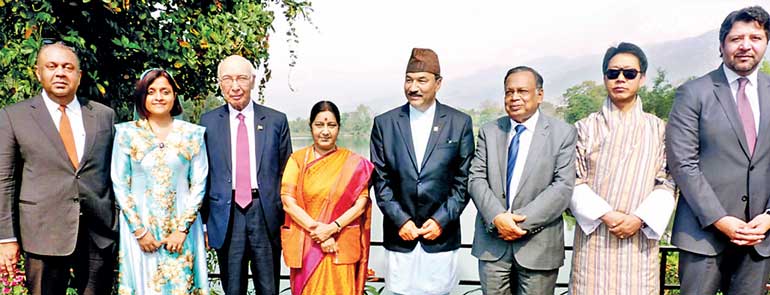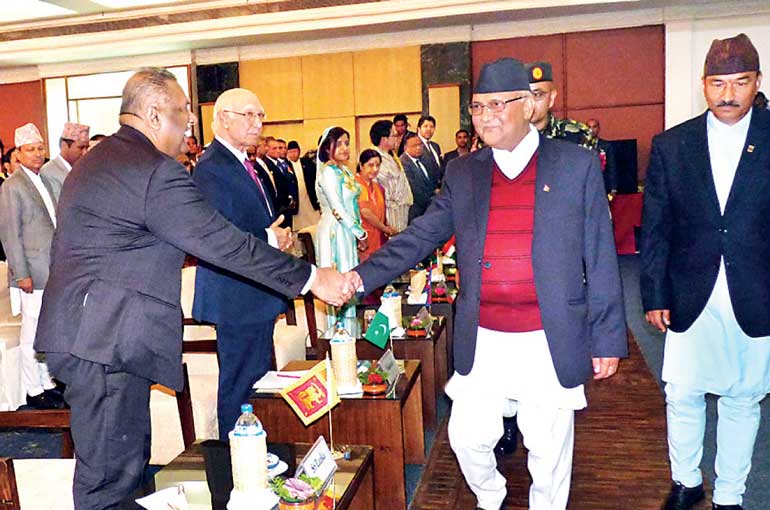Sunday Feb 22, 2026
Sunday Feb 22, 2026
Saturday, 19 March 2016 00:00 - - {{hitsCtrl.values.hits}}

Prime Minister of Nepal Khadga Prasad Sharma Oli and SAARC Foreign Ministers


Reiterating its commitment towards South Asian Association for Regional Cooperation (SAARC) Sri Lanka assured that its engagement with SAARC remains a high priority and called for regional cooperation and integration among the SAARC nations to improve competitiveness and productivity.
Foreign Affairs Minister Mangala Samaraweera addressing the 37th Session of the SAARC Council of Ministers meeting in Pokhara, Nepal on Thursday said Sri Lanka was committed to working with SAARC on promoting regional and multilateral economic cooperation.
The Minister pointed out that although trade under South Asian Free Trade Agreement (SAFTA) had been increasing, the total volume of intra-regional trade in SAARC was far below its actual potential.
“Regional cooperation and integration in South Asia is vital for countries to improve competitiveness and productivity. Open trade, stable and friendly investment policies, could induce more FDI inflow to the region,” he pointed out
Minister Samaraweera said that while welcoming joint proposals by several Member States to fast-track the reduction of the sensitive lists under SAFTA, Sri Lanka would also continue consultations with the stakeholders and work towards the further contraction of the existing Sensitive List in a phased manner.
The Minister noted that although poverty alleviation and improving the living conditions of the region’s people have always been a priority of SAARC, the region was home to around 44% of the world’s poor.
“There is an urgent need for SAARC to take early action to contextualise the newly adopted Sustainable Development agenda and develop an appropriate regional mechanism for its implementation,” he stressed.
Following is the full text of Samaraweera’s speech:
I am indeed happy to attend this important session of the SAARC Council of Ministers in this serene and beautiful city of Pokhara.
Allow me to express my sincere thanks to the Government of Nepal for the warm hospitality extended to me and my delegation and for the excellent arrangements made for the meeting. Sri Lanka appreciates the active and visionary leadership role played by Nepal, as the current Chair, which has given a further momentum to the SAARC process.
I am confident that under the Chairmanship of His Excellency Kamal Thapa, Deputy Prime Minister and Minister of Foreign Affairs of Nepal, our deliberations today will be productive to the processes and initiatives of SAARC.
I wish to thank Secretary General Arjun Bahadur Thapa and the SAARC Secretariat for their important contribution to the preparatory work of this Meeting.
Sri Lanka’s engagement with SAARC
Mr. Chairman, in keeping with Sri Lanka’s commitments towards SAARC, and to move forward the current SAARC activities in different spheres, Sri Lanka’s engagement with SAARC remains a high priority. Last year alone, Sri Lanka was the host to 11 SAARC meetings and workshops relating to several important areas of cooperation. Further, the Government provided necessary resources to national focal agencies to send more than 100 experts and professionals to various SAARC meetings outside Sri Lanka.
Although trade under SAFTA has been increasing, the total volume of intra-regional trade in SAARC is far below than its actual potential. Regional cooperation and integration in South Asia is vital for countries to improve competitiveness and productivity. Open trade, stable and friendly investment policies, could induce more FDI inflow to the region.
Sri Lanka is committed to working with SAARC on promoting regional and multilateral economic cooperation. While welcoming joint proposals by several Member States to fast-track the reduction of the sensitive lists under SAFTA, Sri Lanka will also continue consultations with the stakeholders and work towards the further contraction of the existing Sensitive List in a phased manner.
Poverty alleviation and security challenges
Excellences, poverty alleviation and improving the living conditions of our people have always been a priority of SAARC. Yet, our region is the home for around 44% of the world’s poor. There is an urgent need for SAARC to take early action to contextualise the newly adopted Sustainable Development agenda and develop an appropriate regional mechanism for its implementation.
Mr. Chairman, today, security challenges, both traditional and non-traditional, have become extremely complex and interwoven. The diverse, complex and advanced tactics used by illegal non state actors engaged in terrorism, piracy, trafficking, and smuggling need to be addressed with urgency through cooperation and coordination.
Rich culture and heritage
Excellences, we, as South Asians should be proud of our rich culture and heritage. We need to create a greater awareness of our shared cultural linkages at the people to people level. I wish to state that, Sri Lanka is taking steps to expand the affairs of the SAARC Cultural Centre in Colombo to promote cultural exchanges, our literature, as well as our inherited knowledge and skills amongst a wider audience in the region and beyond.
In this context, we propose to organise the next ‘Galle Literacy Festival,’ Sri Lanka’s foremost international literary festival held annually in the historic coastal city of Galle, with the patronage of SAARC.
Climate change and natural disasters
Mr. Chairman, climate change and natural disasters, which are defining challenges today, also demands a concerted regional and global response. The ferocity and frequency of natural disasters in the region has been a serious challenge to our people.
I also salute the people in Nepal for their courage, strength, and resilience shown in the aftermath of the deadly earthquake that struck the nation on 25 April 2015. I am happy to say that, Sri Lanka, on the instructions of President and Prime Minister, had the opportunity to join the rest of the nations to send immediate assistance to our fellow citizens in Nepal. Sri Lanka has also undertaken the task to reconstruct two heritage temples, a Hindu and a Buddhist temple, damaged by the earthquake. The earthquake posed a major challenge not only to Nepal but also raised questions on the preparedness of the countries in the region to meet such challenges in the future. SAARC’s inability, as a regional organisation, to respond to the Nepal tragedy effectively reflects the absence of a collective response mechanism to mitigate common threats to the region.
Regional Centres
An important item that needs our attention is on Regional Centres. As we all know, Sri Lanka joined the consensus of the Member States to an overall reduction of Regional Centres on the basis that these closures and mergers would help SAARC to sharpen its focus. In the interest of the vast millions of people in our region, we need to move forward and establish the new Regional Centre; SAARC Environment and Disaster Management Centre (SEDMC), and mainstream the disaster risk reduction, preparedness, climate change adaptation and other priorities, in the region.
In conclusion let me say that Sri Lanka subscribe to the vision of a robust multi-dimensional cooperation in South Asia. Let me assure you Your Excellences, that Sri Lanka for its part will spare no effort to translate the vision of the SAARC Charter into reality.
Thank you!